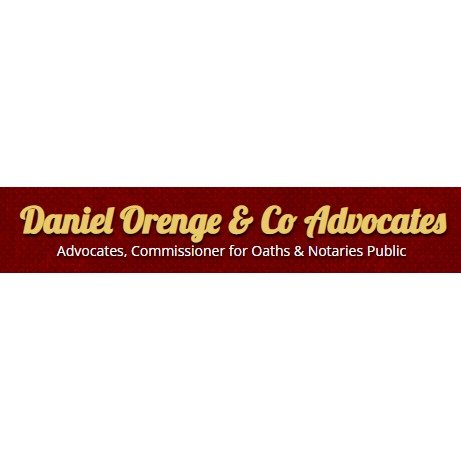Best Landlord & Tenant Lawyers in Nairobi
Share your needs with us, get contacted by law firms.
Free. Takes 2 min.
Free Guide to Hiring a Real Estate Lawyer
List of the best lawyers in Nairobi, Kenya
Legal guides written by Adroit Law LLP:
- Kenya Launches Digital Nomad Visa: A Gateway for Remote Workers
- Navigating the Payment System License Maze in Kenya
- Navigating the Complexities of Mining Licenses and Permits in Kenya: A Look into Artisanal and Large-Scale Operations
About Landlord & Tenant Law in Nairobi, Kenya
Landlord & Tenant law in Nairobi, Kenya governs the relationship between landlords and tenants in rental properties. It provides legal guidelines to regulate the rights and responsibilities of both parties. Understanding these laws is crucial for a smooth and fair renting experience in Nairobi.
Why You May Need a Lawyer
There are certain situations where seeking legal advice from a qualified lawyer specializing in Landlord & Tenant matters can be beneficial. Some common scenarios include:
- Eviction: If you are facing eviction or if you believe that your landlord is evicting you unlawfully, consulting a lawyer can help protect your rights.
- Lease Agreement: A lawyer can review your lease agreement to ensure it is fair and in compliance with the law before you sign it.
- Rent Increase Disputes: If you disagree with the amount or frequency of rent increases imposed by your landlord, a lawyer can provide guidance on appropriate legal action.
- Deposit Issues: If there are disputes related to the return of your rental deposit or any deductions made by the landlord, legal advice can help protect your interests.
- Repairs and Maintenance: If your landlord fails to maintain the rental property or fulfill their repair obligations, seeking legal assistance can help in resolving this issue.
Local Laws Overview
Nairobi, Kenya has specific laws that govern Landlord & Tenant relationships. Here are key aspects of the local laws that are particularly relevant:
- Renting Agreements: Rental agreements in Nairobi can be oral or written. However, it is advisable to have a written agreement to clearly outline the terms and conditions.
- Security Deposits: The law allows landlords to request security deposits, usually equivalent to one or two months' rent. The landlord must provide a receipt and return the deposit, minus any legitimate deductions, within thirty days of the tenancy ending.
- Rent Increase: Landlords can increase rent, but they must give the tenant appropriate notice in writing, generally thirty days in advance.
- Repairs and Maintenance: The law requires landlords to maintain the rental property in a habitable condition, ensuring basic amenities like water, electricity, and sanitation are provided. Tenants should promptly report any maintenance issues to the landlord in writing.
- Evictions: There are specific procedures and grounds for eviction in Nairobi. A landlord must follow the proper legal process and obtain a court order before evicting a tenant.
Frequently Asked Questions
1. Can a landlord enter my rented property without notice?
No, a landlord must provide reasonable notice before entering a rented property, except in emergencies. Usually, twenty-four to forty-eight hours written notice is required unless otherwise agreed upon.
2. Can a landlord increase the rent arbitrarily?
No, rent increases must be reasonable and in line with the local rental market. The landlord must provide written notice of the increase within the specified period mentioned in the tenancy agreement or local laws.
3. How can I terminate my tenancy agreement early?
Early termination depends on the terms of your lease agreement. Generally, notice in writing must be provided to the landlord within the specified period mentioned in the agreement or local laws. It is advisable to consult a lawyer to understand your rights and obligations.
4. What can I do if my landlord refuses to make necessary repairs?
If your landlord fails to make repairs, you can first notify them in writing, clearly stating the required repairs and a reasonable deadline. If they still do not take action, you may file a complaint with the relevant local authority or consult a lawyer for further assistance.
5. Can a landlord withhold my security deposit without a valid reason?
No, your landlord can only deduct from your security deposit for legitimate reasons such as unpaid rent, damages beyond normal wear and tear, or outstanding utility bills. If the landlord fails to return your deposit or deducts excessively, you may take legal action to recover your deposit.
Additional Resources
For further information and assistance regarding Landlord & Tenant issues, you may find the following resources helpful:
- Nairobi City County Government Landlord and Tenant Board - provides guidance and information on landlord-tenant matters in Nairobi.
- Lands Ministry of Kenya - offers resources and information related to property laws and regulations in Kenya.
- Kenya Law - an online legal resource offering access to Kenyan laws, statutes, and legal judgments.
Next Steps
If you find yourself needing legal assistance regarding Landlord & Tenant matters in Nairobi, Kenya, follow these steps:
- Gather all relevant documents and correspondence related to your issue.
- Research and identify lawyers specializing in Landlord & Tenant law in Nairobi.
- Set up a consultation to discuss your case and evaluate the lawyer's expertise.
- During the consultation, ask about their fees, experience, and possible strategies for your situation.
- Choose the lawyer you feel comfortable with, and proceed with their guidance to navigate the legal process.
Lawzana helps you find the best lawyers and law firms in Nairobi through a curated and pre-screened list of qualified legal professionals. Our platform offers rankings and detailed profiles of attorneys and law firms, allowing you to compare based on practice areas, including Landlord & Tenant, experience, and client feedback.
Each profile includes a description of the firm's areas of practice, client reviews, team members and partners, year of establishment, spoken languages, office locations, contact information, social media presence, and any published articles or resources. Most firms on our platform speak English and are experienced in both local and international legal matters.
Get a quote from top-rated law firms in Nairobi, Kenya — quickly, securely, and without unnecessary hassle.
Disclaimer:
The information provided on this page is for general informational purposes only and does not constitute legal advice. While we strive to ensure the accuracy and relevance of the content, legal information may change over time, and interpretations of the law can vary. You should always consult with a qualified legal professional for advice specific to your situation.
We disclaim all liability for actions taken or not taken based on the content of this page. If you believe any information is incorrect or outdated, please contact us, and we will review and update it where appropriate.

















